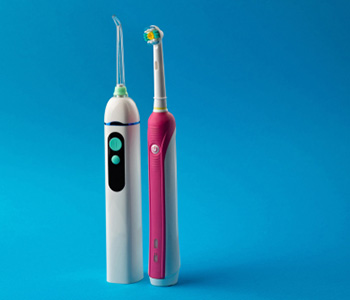Are you curious about “What is dental irrigation and why do I need it? Aldershot Dentist, Dr. Khanna, explains
Have you been diagnosed with periodontal disease? If so, your dentist may have recommended dental irrigation. The primary purpose of this treatment is to reduce the number of bacteria in the mouth which can aid in the treatment of periodontal disease. At Dentistry at La Salle in Aldershot, we encourage all our patients to maintain routine dental exams and cleanings which can reduce the risk of periodontal disease. However, if periodontal disease does occur, do not worry, our team is well equipped to offer treatment that will restore oral health.

What is periodontal disease?
Periodontal disease is a progressive dental condition that over time will cause gum inflammation, sensitivity, bone loss, tissue loss, and eventually tooth loss if left untreated. The first stage of periodontal disease is called gingivitis. During this stage, patients often experience tender, inflamed gums or bleeding gums while brushing. In most cases, gingivitis can be treated with a thorough professional cleaning and improvement with at-home oral care. If gingivitis is left untreated, it will advance to periodontitis. At this point, gum tissue will begin to pull away from the teeth, forming deep pockets that trap bacteria and cause infection. Over time, the infection will begin to affect the health of the gum tissue and bone, causing severe damage.
Treating periodontal disease
There are a few different ways that we can stop the progression of periodontal disease and improve oral health. One of these treatments is called oral irrigation or pocket irrigation.
Oral irrigation is a dental procedure that is effective at flushing out plaque, bacteria and other toxins that become trapped in the small spaces between teeth and under the gumline, preventing the buildup of harmful bacteria. The treatment is also used to deliver antimicrobials under the gumline.
How does oral irrigation work?
Oral irrigation can be done as a stand-alone treatment or combined with other dental treatments.
During a deep cleaning for periodontal disease, the oral irrigator is often used after a procedure called scaling and root planing. The oral irrigation flushes out the periodontal pockets and is used to apply an antimicrobial substance to further eliminate harmful bacteria.
For advanced periodontitis, oral irrigation can be used as an adjunct to pocket reduction surgery. During this instance, oral irrigation is done at the end of the procedure as an additional method of reducing and eliminating harmful bacteria.
Why you need oral irrigation

Oral irrigation can be used for several different reasons to improve oral health. They include:
Interdental Cleaning – Oral irrigation is effective at blasting away food particles, debris, and plaque buildup from between teeth. By removing harmful bacteria, the irrigation process flushes out the periodontal pockets to improve the health of gum tissue.
Treating bad breath – The medical term for bad breath is halitosis and the condition is typically caused by food particles that are stuck between teeth along with tooth decay. At-home brushing alone cannot remove these particles, however, the jets from oral irrigation can flush out the food particles between the teeth and below the gum line.
Subgingival cleaning – Oral irrigation is an extremely safe and effective way to flush out bacteria and other toxins trapped underneath the gum line.
Antimicrobial treatment – Antimicrobial substances are often combined with the water during oral irrigation and applied under the gum line to eliminate harmful bacteria.
Or
Book an Appointment
Oral Irrigation at Home
In addition to being used in the dental office, oral irrigation can be done at home with a water pick. The device delivers a jet of high-pressure water to eliminate food particles and other debris stuck between teeth. Many individuals prefer a water pick to flossing to clean between the teeth. If you are unable to floss effectively, a water pick may be the right solution.
It is important to note that a water pick should not be a substitute for routine dental cleanings. These professional cleanings are very effective at removing harmful tartar and plaque buildup to keep teeth healthy.
At Dentistry at La Salle, we want our patients to fully understand the different dental treatments available and why they are needed to restore oral health. If you would like more information on oral irrigation, please give us a call at (905) 481-9078.




